This entry has grown organically in two ways. First, it grows from the context of Blog 171 and Blog 174. And secondly, it grows organically from my own life, in which I see reflections in Scripture. The first section is going to be some reflections from my own life. Feel free to skim the parts about my life if you are in a rush. It is a fairly long entry. Remember, I have told you all along that I believe God speaks to us through a combination of what transpires in our lives on this earth plus his written word. People might occasionally get an audible voice; that seems to be far more rare, especially these days. But to each of us he speaks through “life,” which is witnessed again in Scripture.
Some more background from my life. I shared in Blog 171 that my dad was a “real man,” tough as nails. A little more about him: this story from my grandmother, his mother. When Dad was a toddler and he was “given a spanking” for misbehaving, he would refuse to cry. My grandmother said whether it was she or my grandfather doling out the punishment, Dad’s refusal to cry felt like defiance and would tend to make the punisher want to punish even more.
That story is certainly consistent with what we saw in him as an adult. He was very stoic. He lost his temper with me a time or two, but he never (well, once, when his father died, he cried a very little and then apologized for his weakness, which he blamed on his own illness) showed a softer side, at least not to me as his son. Maybe my mom or my sisters got to see another side.
Now fast-forward to me. I have more androgynous qualities, having both more “traditional” male and female traits. I cry easily and am not ashamed of my tears. Maybe Dad was able to see that more androgynous side of me and it scared him (🤷🏼♂️ just speculation), fearing I might turn out to be a “sissy” or “gay.” I really don’t know. But I do know he spent time with me on more traditionally male activities, hunting, fishing, tinkering on cars, etc. In my helping to raise my own children, we raised our kids (boys and girls) less in traditional roles, but encouraging all sides and leaving direction to their own inclinations.
I have in the past had a tendency to think my ability to “see both sides of everything” came from the fact that my mom was an artist, being an excellent painter in her teen years, and my dad was a scientist, a medical doctor. I guess that would be the “nurture” side of the equation. But perhaps this Scriptural study might argue some for the “nature” element of the argument. Are we not a product of both “nature and nurture?”
I see my life reflected in the story of Isaac and Rebekah’s sons Esau and Jacob, especially the passage in Genesis 25:23-28 shared last time. And this story is a driving factor in my digging deeper to get at Yeshua/Jesus and the Alpha/Omega. My dad was much more the Esau-type guy, his hobbies being guns, hunting, etc. And I am probably more the Jacob-type guy. And interesting that:

My dad and his hunting buddies would sit in the den and tell tall tales about their hunting or fishing escapades, and I would tend to drift to help Mom in the kitchen. 🤔 And, I am the first to say “don’t stereotype,” but multiple witnesses do get me thinking. And I personally think that not stereotyping is clearly shown in Scripture, especially by Jacob. There are actually two different places in TaNaKh where God changes Jacob’s name to Israel (Genesis 32:28, 35:10), but even after that second time he is known by either name at different times. We are not all that “predictable.”
I have looked at this verse for years:
⦁ Genesis 25:27 NKJV
27 So the boys grew. And Esau was a skillful hunter, a man of the field; but Jacob was a mild man, dwelling in tents.
⦁ Genesis 25:27 ESV
27 When the boys grew up, Esau was a skillful hunter, a man of the field, while Jacob was a quiet man, dwelling in tents.
- I’ll share my thinking, and as always, you can just toss it out if you don’t want to consider. You see the two most common translations I use here disagree on how they describe Jacob, one saying “mild” and the other saying “quiet.” I have suggested before (post 06. Bible Translations) that we learn much from seeing where translations differ. Let’s go to the Hebrew, and please see that we looked at the more literal translation in context last time.
⦁ Genesis 25:27
27 וַֽיִּגְדְּלוּ֙ הַנְּעָרִ֔ים וַיְהִ֣י עֵשָׂ֗ו אִ֛ישׁ יֹדֵ֥עַ צַ֖יִד אִ֣ישׁ שָׂדֶ֑ה וְיַעֲקֹב֙ אִ֣ישׁ תָּ֔ם יֹשֵׁ֖ב אֹהָלִֽים׃
The word in question there is תם. Here from Enhanced Strong’s Dictionary.
▸ ESD h8535. תָּם ṯom; from h8552. תָּמַם ṯâmam; complete; usually (morally) pious; specifically, gentle, dear: — coupled together, perfect, plain, undefiled, upright.
AV (13) – perfect 9, undefiled 2, plain 1, upright 1;
- perfect, complete
- complete, perfect
- one who lacks nothing in physical strength, beauty, etc
- sound, wholesome
- an ordinary, quiet sort of person
- complete, morally innocent, having integrity
- one who is morally and ethically pure
- complete, perfect
▸ ESD h8537. תֹּם ṯôm; from h8552. תָּמַם ṯâmam; completeness; figuratively, prosperity; usually (morally) innocence: — full, integrity, perfect(-ion), simplicity, upright(-ly, -ness), at a venture. See 8550.
AV (23) – integrity 11, upright 2, uprightly 2, uprightness 2,venture 2, full 1, perfect 1, perfection 1, simplicity 1;
- integrity, completeness
- completeness, fulness
- innocence, simplicity
- integrity
- I used the word “complete” in my literal translation from Brown-Driver-Briggs.
- What does “complete” mean? I used the את studies to help me with that. (( I will say that איש and תם occur together upon the same verse three more times in TaNaKh, all three early in Job, and in both ESV and NKJV, תם is translated as “blameless.” We have already covered previously on the website that I am anything but “blameless, having transgressed all of the “Ten Commandments,” either in fact or in spirit, in my life. So, if that is really what תם means, I am barking up the wrong tree. ))

- See that את highlights “man complete.”
Now, please go to the passage on the “building” of woman:
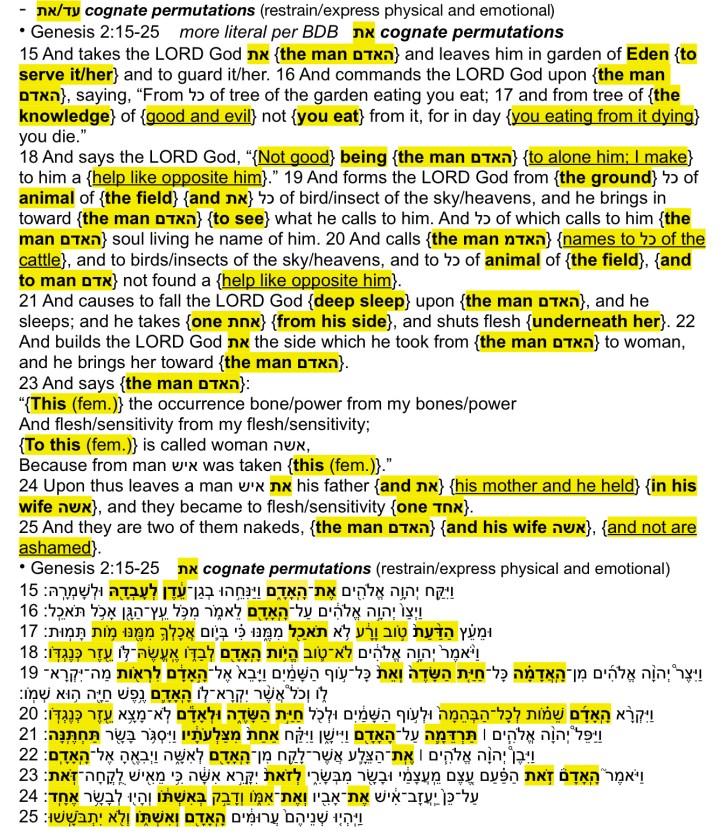
- We will hopefully (Lord willing) look at other aspects of this specific passage at another time, but for now we are looking at “physical AND emotional” being expressed or restrained. We referred to it in the previous Alpha and Omega blog, that Yeshua/Jesus exemplified both expression and restraint of the physical plus the emotional. He demonstrated there are times and places that both are appropriate. In this, if we look at Genesis 2:15-25, we may see a more masculine and a more feminine “side.” We are going to look at some other contexts which I knew to be emotional settings to see if את tells us more about to what Yeshua/Jesus might have been referring?
⦁ Leviticus 10:1-3
1 Then Nadab and Abihu, the sons of Aaron, each took his censer and put fire in it, put incense on it, and offered profane fire before the LORD, which He had not commanded them. 2 So fire went out from the LORD and devoured them, and they died before the LORD. 3 And Moses said to Aaron, “This is what the LORD spoke, saying:
‘By those who come near Me
I must be regarded as holy;
And before all the people
I must be glorified.’”
So Aaron held his peace.
⦁ Leviticus 10:3
3 וַיֹּ֨אמֶר מֹשֶׁ֜ה אֶֽל־אַהֲרֹ֗ן הוּא֩ אֲשֶׁר־דִּבֶּ֨ר יְהוָ֤ה ׀ לֵאמֹר֙ בִּקְרֹבַ֣י אֶקָּדֵ֔שׁ וְעַל־פְּנֵ֥י כָל־הָעָ֖ם אֶכָּבֵ֑ד וַיִּדֹּ֖ם אַהֲרֹֽן׃
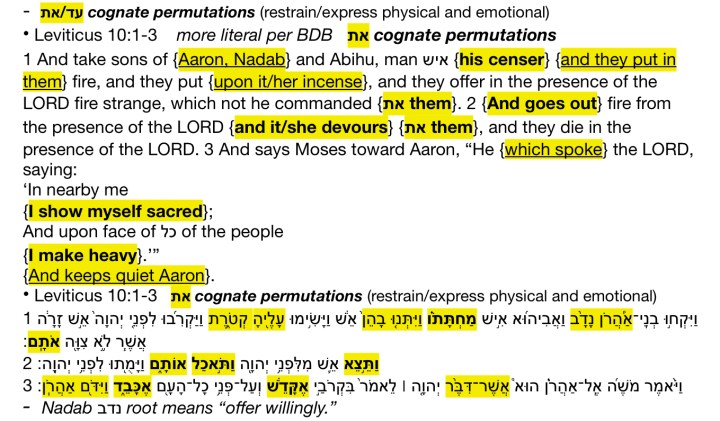
⦁ Numbers 20:10-13
10 And Moses and Aaron gathered the assembly together before the rock; and he said to them, “Hear now, you rebels! Must we bring water for you out of this rock?” 11 Then Moses lifted his hand and struck the rock twice with his rod; and water came out abundantly, and the congregation and their animals drank.
12 Then the LORD spoke to Moses and Aaron, “Because you did not believe Me, to hallow Me לְהַ֨קְדִּישֵׁ֔נִי in the eyes of the children of Israel, therefore you shall not bring this assembly into the land which I have given them.”
13 This was the water of Meribah, because the children of Israel contended with the LORD, and He was hallowed among them.
- I “happened to notice” that את showed up in a couple of places where the LORD speaks of being hallowed or upheld as holy.
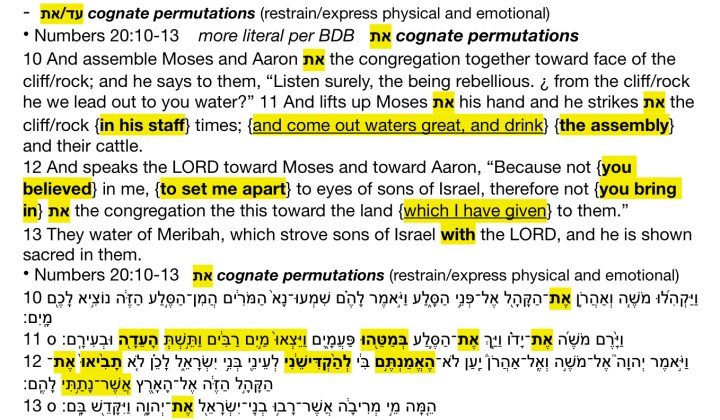
- It is made clear in many places that our God has emotions, but perhaps it was necessary to demonstrate just what it would look like physically? Could he pour the fullness of his Spirit into the body of a man so that we could “see?” Bearing with frustrations, turning the other cheek, but chasing money-changers with whips and calling Pharisees and scribes hypocrites: how and in what circumstances do we demonstrate our emotions?
⦁ Deuteronomy 3:23-27
23 “Then I pleaded with the LORD at that time, saying: 24 ‘O Lord GOD, You have begun to show Your servant Your greatness and Your mighty hand, for what god is there in heaven or on earth who can do anything like Your works and Your mighty deeds? 25 I pray, let me cross over and see the good land beyond the Jordan, those pleasant mountains, and Lebanon.’
26 “But the LORD was angry with me on your account, and would not listen to me. So the LORD said to me: ‘Enough of that! Speak no more to Me of this matter. 27 Go up to the top of Pisgah, and lift your eyes toward the west, the north, the south, and the east; behold it with your eyes, for you shall not cross over this Jordan.
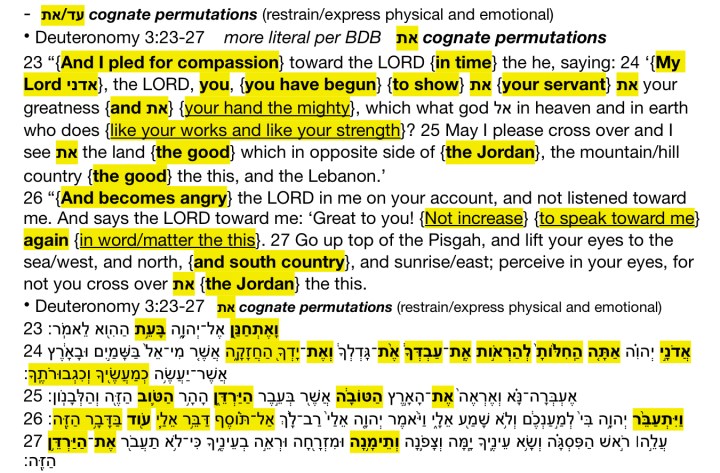
⦁ Numbers 27:13-14 ESV
13 When you have seen it, you also shall be gathered to your people, as your brother Aaron was, 14 because you rebelled against my word in the wilderness of Zin when the congregation quarreled, failing to uphold me as holy at the waters before their eyes.” (These are the waters of Meribah of Kadesh in the wilderness of Zin.)
Numbers 27:14
14 כַּאֲשֶׁר֩ מְרִיתֶ֨ם פִּ֜י בְּמִדְבַּר־צִ֗ן בִּמְרִיבַת֙ הָֽעֵדָ֔ה לְהַקְדִּישֵׁ֥נִי בַמַּ֖יִם לְעֵינֵיהֶ֑ם הֵ֛ם מֵֽי־מְרִיבַ֥ת קָדֵ֖שׁ מִדְבַּר־צִֽן׃ פ
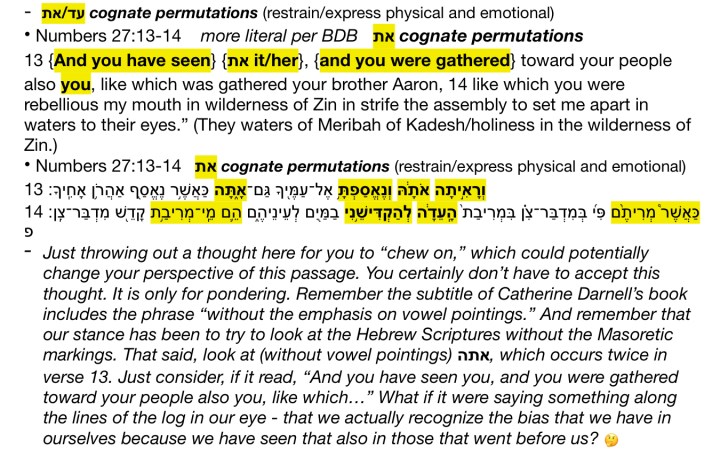
⦁ Genesis 18:19-21
19 For I have known him, in order that he may command his children and his household after him, that they keep the way of the LORD, to do righteousness and justice, that the LORD may bring to Abraham what He has spoken to him.” 20 And the LORD said, “Because the outcry against Sodom and Gomorrah is great, and because their sin is very grave, 21 I will go down now and see whether they have done altogether according to the outcry against it that has come to Me; and if not, I will know.”
⦁ Genesis 18:19-21
19 כִּ֣י יְדַעְתִּ֗יו לְמַעַן֩ אֲשֶׁ֨ר יְצַוֶּ֜ה אֶת־בָּנָ֤יו וְאֶת־בֵּיתוֹ֙ אַחֲרָ֔יו וְשָֽׁמְרוּ֙ דֶּ֣רֶךְ יְהוָ֔ה לַעֲשֹׂ֥ות צְדָקָ֖ה וּמִשְׁפָּ֑ט לְמַ֗עַן הָבִ֤יא יְהוָה֙ עַל־אַבְרָהָ֔ם אֵ֥ת אֲשֶׁר־דִּבֶּ֖ר עָלָֽיו׃
20 וַיֹּ֣אמֶר יְהוָ֔ה זַעֲקַ֛ת סְדֹ֥ם וַעֲמֹרָ֖ה כִּי־רָ֑בָּה וְחַ֨טָּאתָ֔ם כִּ֥י כָבְדָ֖ה מְאֹֽד׃
21 אֵֽרֲדָה־נָּ֣א וְאֶרְאֶ֔ה הַכְּצַעֲקָתָ֛הּ הַבָּ֥אָה אֵלַ֖י עָשׂ֣וּ ׀ כָּלָ֑ה וְאִם־לֹ֖א אֵדָֽעָה׃
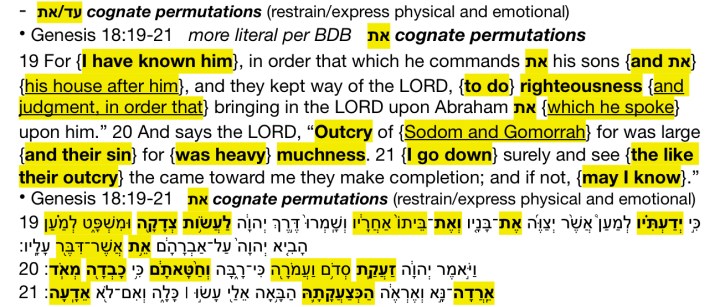
⦁ 2 Samuel 12:15-23
15 Then Nathan departed to his house.
And the LORD struck the child that Uriah’s wife bore to David, and it became ill. 16 David therefore pleaded with God for the child, and David fasted and went in and lay all night on the ground. 17 So the elders of his house arose and went to him, to raise him up from the ground. But he would not, nor did he eat food with them. 18 Then on the seventh day it came to pass that the child died. And the servants of David were afraid to tell him that the child was dead. For they said, “Indeed, while the child was alive, we spoke to him, and he would not heed our voice. How can we tell him that the child is dead? He may do some harm!”
19 When David saw that his servants were whispering, David perceived that the child was dead. Therefore David said to his servants, “Is the child dead?”
And they said, “He is dead.”
20 So David arose from the ground, washed and anointed himself, and changed his clothes; and he went into the house of the LORD and worshiped. Then he went to his own house; and when he requested, they set food before him, and he ate.
21 Then his servants said to him, “What is this that you have done? You fasted and wept for the child while he was alive, but when the child died, you arose and ate food.”
22 And he said, “While the child was alive, I fasted and wept; for I said, ‘Who can tell whether the LORD will be gracious to me, that the child may live?’ 23 But now he is dead; why should I fast? Can I bring him back again? I shall go to him, but he shall not return to me.”
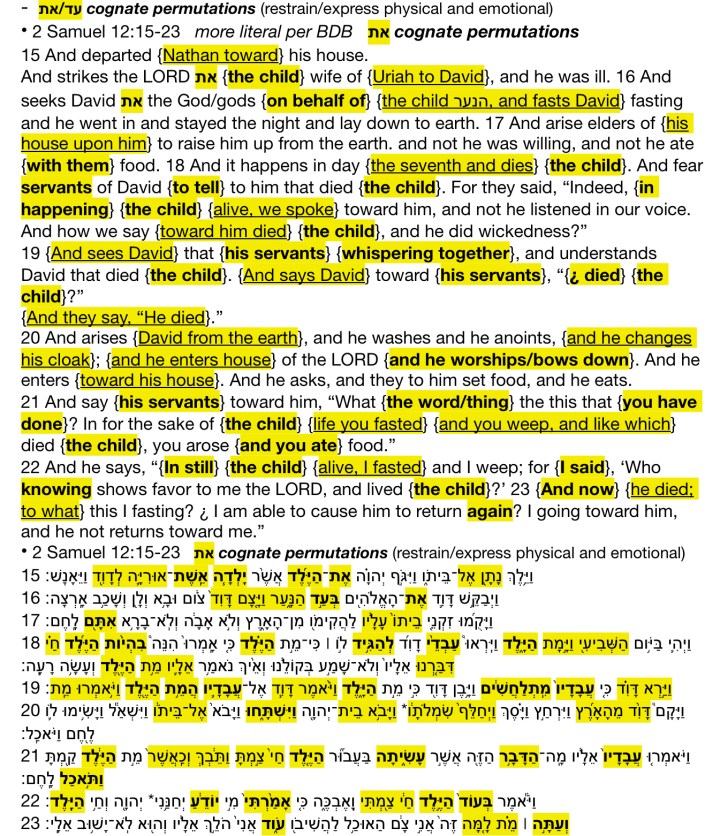
- This passage explains SO MUCH! I don’t want to take away your opportunity to learn on your own, but will share a couple of things. Remember הארץ is either“the earth” or “the land.” See the connection between our eating and our emotions. And one more thing is to trust those “gut feelings.” I’ll stop here, but you should not…
- Of course, so much that I see has come through Scripture plus what has happened in my lifetime that helps to open my eyes…
- If you have ever read The Shack or watched the movie, you may see how Young has connected God’s pain with Yeshua/Jesus’s pain.
- And the list goes on.
⦁ Exodus 3:7-9 NKJV
7 And the LORD said: “I have surely seen the oppression of My people who (are) in Egypt, and have heard their cry because of their taskmasters, for I know their sorrows. 8 So I have come down to deliver them out of the hand of the Egyptians, and to bring them up from that land to a good and large land, to a land flowing with milk and honey, to the place of the Canaanites and the Hittites and the Amorites and the Perizzites and the Hivites and the Jebusites. 9 Now therefore, behold, the cry of the children of Israel has come to Me, and I have also seen the oppression with which the Egyptians oppress them.
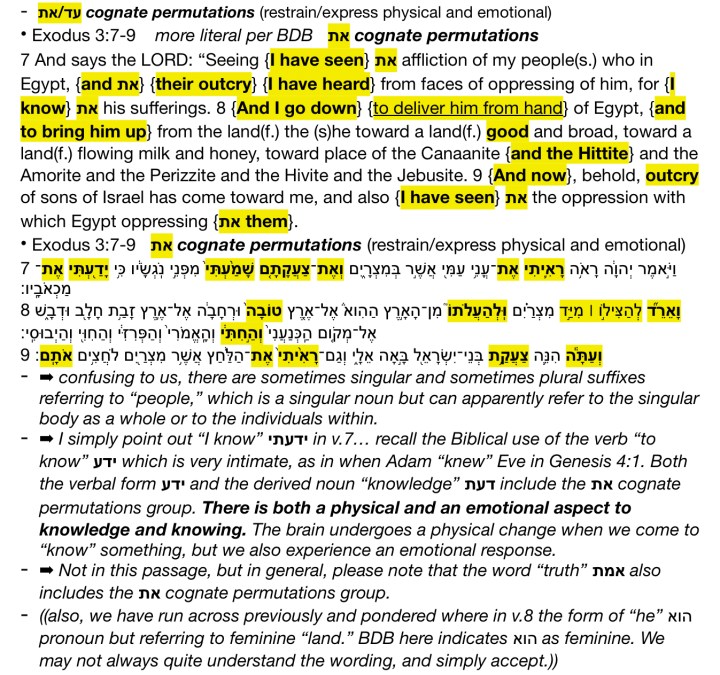
✱ see the companion blog, Blog 176. Learning and Dopamine
⦁ Genesis 48:15-22 ESV
15 And he blessed Joseph and said,
“The God before whom my fathers Abraham and Isaac walked,
the God who has been my shepherd all my life long to this day,
16 the angel who has redeemed me from all evil, bless the boys;
and in them let my name be carried on, and the name of my fathers Abraham and Isaac;
and let them grow into a multitude in the midst of the earth.”
17 When Joseph saw that his father laid his right hand on the head of Ephraim, it displeased him, and he took his father’s hand to move it from Ephraim’s head to Manasseh’s head. 18 And Joseph said to his father, “Not this way, my father; since this one is the firstborn, put your right hand on his head.” 19 But his father refused and said, “I know, my son, I know. He also shall become a people, and he also shall be great. Nevertheless, his younger brother shall be greater than he, and his offspring shall become a multitude of nations.” 20 So he blessed them that day, saying,
“By you Israel will pronounce blessings, saying,
‘God make you as Ephraim and as Manasseh.’”
Thus he put Ephraim before Manasseh. 21 Then Israel said to Joseph, “Behold, I am about to die, but God will be with you and will bring you again to the land of your fathers. 22 Moreover, I have given to you rather than to your brothers one mountain slope that I took from the hand of the Amorites with my sword and with my bow.”
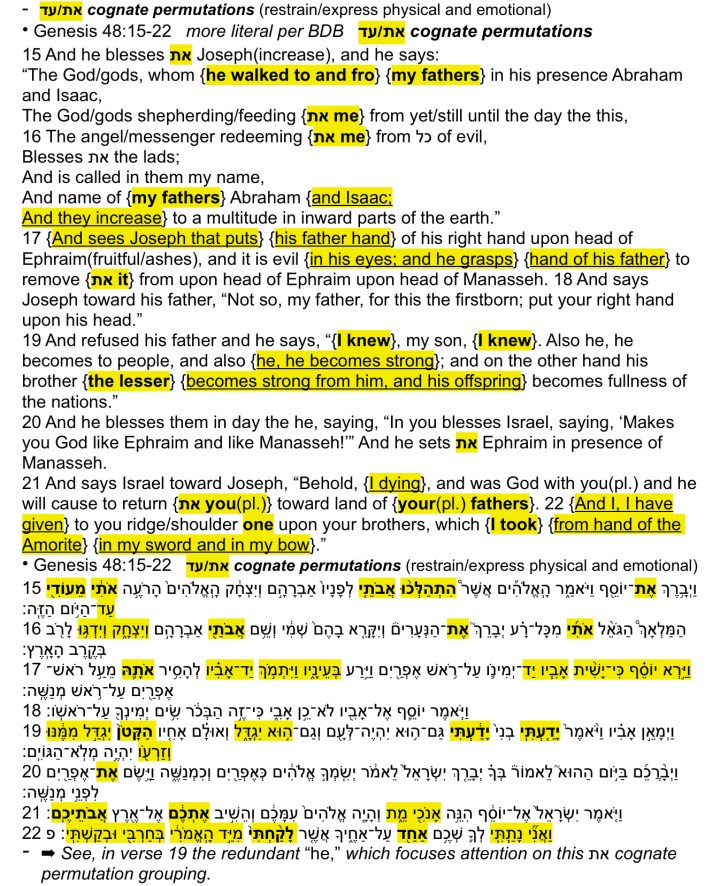
⦁ Genesis 8:21-22 NKJV
21 And the LORD smelled a soothing aroma. Then the LORD said in His heart, “I will never again curse the ground for man’s sake, although the imagination of man’s heart is evil from his youth; nor will I again destroy every living thing as I have done.
22 “While the earth remains,
Seedtime and harvest,
Cold and heat,
Winter and summer,
And day and night
Shall not cease.”

⦁ Numbers 20:10-13 NKJV
10 And Moses and Aaron gathered the assembly together before the rock; and he said to them, “Hear now, you rebels! Must we bring water for you out of this rock?” 11 Then Moses lifted his hand and struck the rock twice with his rod; and water came out abundantly, and the congregation and their animals drank.
12 Then the LORD spoke to Moses and Aaron, “Because you did not believe Me, to hallow Me in the eyes of the children of Israel, therefore you shall not bring this assembly into the land which I have given them.”
13 This was the water of Meribah, because the children of Israel contended with the LORD, and He was hallowed among them.

⦁ Zechariah 10:3-5 ESV
3 “My anger is hot against the shepherds,
and I will punish the leaders;
for the LORD of hosts cares for his flock, the house of Judah,
and will make them like his majestic steed in battle.
4 From him shall come the cornerstone,
from him the tent peg,
from him the battle bow,
from him every ruler—all of them together.
5 They shall be like mighty men in battle,
trampling the foe in the mud of the streets;
they shall fight because the LORD is with them,
and they shall put to shame the riders on horses.

- (((( this Zechariah passage actually came up when I was researching the word יתד “peg” in verse 4, and I truly hope to be able to share that research with you later – not yet completed. All in the will of the LORD. ))))
⦁ Psalms 68:17-19 NKJV
17 The chariots of God are twenty thousand,
Even thousands of thousands;
The Lord is among them as in Sinai, in the Holy Place.
18 You have ascended on high,
You have led captivity captive;
You have received gifts among men,
Even from the rebellious,
That the LORD God might dwell there.
19 Blessed be the Lord,
Who daily loads us with benefits,
The God of our salvation!
Selah
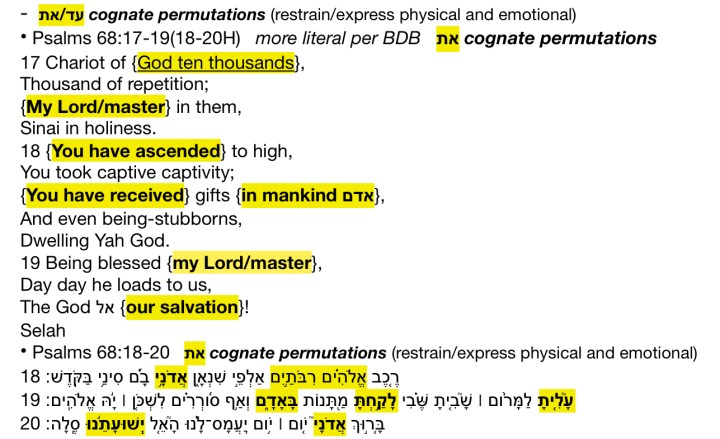
⦁ Deuteronomy 3:23-27 ESV
23 “And I pleaded with the LORD at that time, saying, 24 ‘O Lord GOD, you have only begun to show your servant your greatness and your mighty hand. For what god is there in heaven or on earth who can do such works and mighty acts as yours? 25 Please let me go over and see the good land beyond the Jordan, that good hill country and Lebanon.’ 26 But the LORD was angry with me because of you and would not listen to me. And the LORD said to me, ‘Enough from you; do not speak to me of this matter again. 27 Go up to the top of Pisgah and lift up your eyes westward and northward and southward and eastward, and look at it with your eyes, for you shall not go over this Jordan.
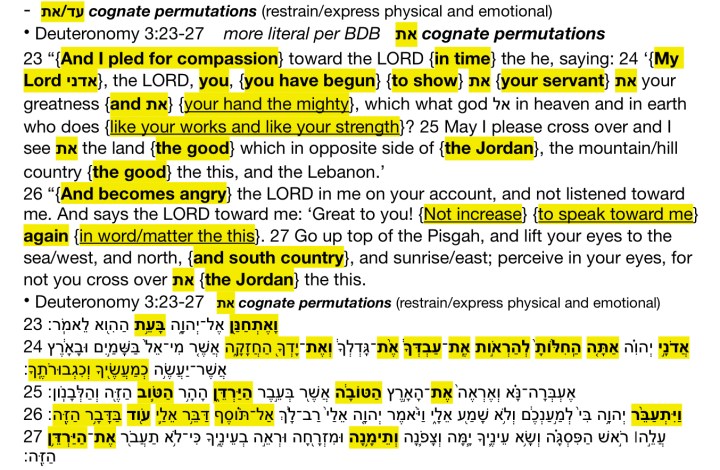
⦁ Deuteronomy 20:1-8
1 “When you go out to battle against your enemies, and see horses and chariots and people more numerous than you, do not be afraid of them; for the LORD your God is with you, who brought you up from the land of Egypt. 2 So it shall be, when you are on the verge of battle, that the priest shall approach and speak to the people. 3 And he shall say to them, ‘Hear, O Israel: Today you are on the verge of battle with your enemies. Do not let your heart faint, do not be afraid, and do not tremble or be terrified because of them; 4 for the LORD your God is He who goes with you, to fight for you against your enemies, to save you.’
5 “Then the officers shall speak to the people, saying: ‘What man (is there) who has built a new house and has not dedicated it? Let him go and return to his house, lest he die in the battle and another man dedicate it. 6 Also what man (is there) who has planted a vineyard and has not eaten of it? Let him go and return to his house, lest he die in the battle and another man eat of it. 7 And what man (is there) who is betrothed to a woman and has not married her? Let him go and return to his house, lest he die in the battle and another man marry her.’
8 “The officers shall speak further to the people, and say, What man (is there who is) fearful and fainthearted? Let him go and return to his house, lest the heart of his brethren faint like his heart.’
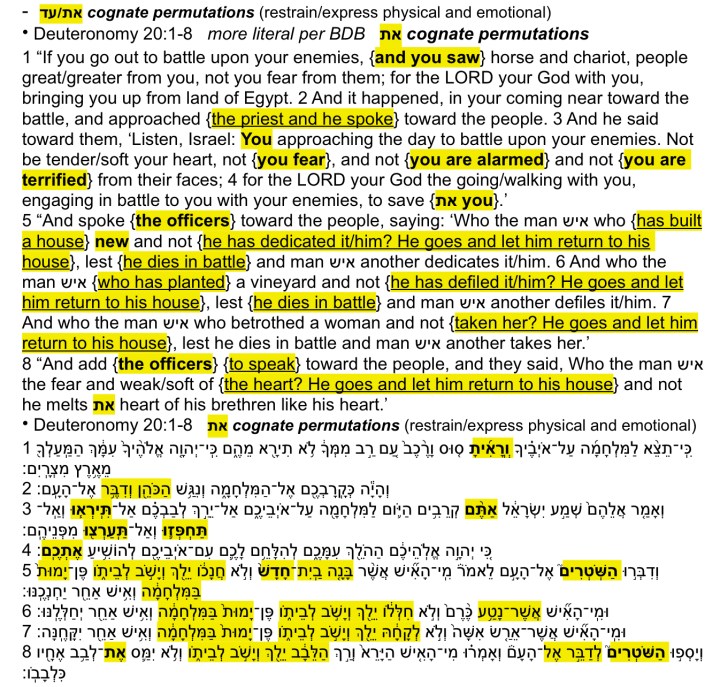
I think I have shared enough passages for you to get the gist of את. And I don’t want to tell you how to interpret things, but to let the LORD speak to your heart based upon your own life and upon Scripture. What I would like to do, to get you to 🤔, is to pose questions. What impression do you get of the man Moses, in relation to the idea of (restrain/express, physical and emotional)? And what impression do you get of the man David? I have formed opinions, but it is not my job to give you answers, but to raise the question.
I leave you to ponder.
Many blessings to you.
PG
Ⓒ Copyright Philip E. Gates; LogAndSpeck.com September 2025